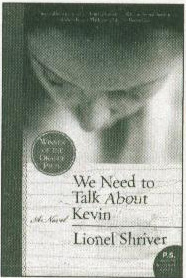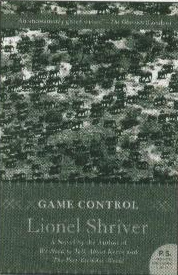The Female of the Species (43 page)
Read The Female of the Species Online
Authors: Lionel Shriver

The Sporting Club
, by Thomas McGuane
Bright Lights, Big City
, by Jay McInerney
Ghostwritten
, by David Mitchell
Buffalo Soldiers
, by Robert O’Connor
Postcards
, by Annie Proulx
Goodbye, Columbus
, by Philip Roth
Mohawk
, by Richard Russo
Life-Size
, by Jenefer Shute
Hall of Mirrors
, by Robert Stone
Revolutionary Road
, by Richard Yates
Have You Read?
More by Lionel Shriver
THE POST-BIRTHDAY WORLD
American children’s book illustrator Irina McGovern enjoys a secure, settled life in London with her smart, loyal, disciplined partner, Lawrence—until the night she finds herself inexplicably drawn to kissing another man, a passionate, extravagant, top-ranked snooker player. Two competing alternate futures hinge on this single kiss, as Irina’s decision—to surrender to temptation or to preserve her seemingly safe partnership with Lawrence—will have momentous consequences for her career, her friendships and familial relationships, and the texture of her daily life.

“A layered and unflinching portrait of infidelity…. Shriver pulls off a tremendous feat of characterization…. Better yet, the author is more interested in raising questions about love and fidelity than in pat moralizing. Readers will wonder which choice was best for Irina, but Shriver masterfully confounds any attempt to arrive at a sure answer.”
—Kirkus Reviews
(starred review)
WE NEED TO TALK ABOUT KEVIN

Eva never really wanted to be a mother—and certainly not the mother of the malicious boy who murdered seven of his fellow high school students, a cafeteria worker, and a much-adored teacher who tried to befriend him, all two days before his sixteenth birthday. Now, two years later, it is time for her to come to terms with marriage, career, family, parenthood, and Kevin’s horrific rampage in a series of startlingly direct correspondences with her estranged husband, Franklin. Uneasy with the sacrifices and social
demotion of motherhood from the start, Eva fears that her alarming dislike for her own son may be responsible for driving him so nihilistically off the rails.
“Sometimes searing…impossible to put down…brutally honest…. Who, in the end, needs to talk about Kevin? Maybe we all do.”
—Boston Globe
DOUBLE FAULT

Tennis has been Willy Novinsky’s one love ever since she first picked up a racquet at the age of four. A middle-ranked pro at twenty-three, she’s met her match in Eric Oberdorf, a low-ranked, untested Princeton grad who also intends to make his mark on the international tennis circuit. Eric becomes Willy’s first passion off the court, and eventually they marry. But while wedded life begins well, full-tilt competition soon puts a strain on their relationship—and an unexpected accident sends driven and gifted Willy sliding irrevocably toward resentment, tragedy, and despair.
From acclaimed author Lionel Shriver comes a brilliant and unflinching novel about the devastating cost of prizing achievement over love.
“Shriver shows in a masterstroke why character is fate and how sport reveals it.”
—New York Times Book Review
“A brilliant tale of doomed love…. This is not a novel about tennis or rivalry; it’s about love, marriage, and the balance of power in relationships….
Double Fault
is a compelling and playfully ironic take on the sex wars, blistering with…brilliant writing and caustic language.”
—The Observer
(London)
A PERFECTLY GOOD FAMILY

Following the death of her worthy liberal parents, Corlis McCrea moves back into her family’s grand Reconstruction mansion in North Carolina, willed to all three siblings. Her timid younger brother has never left home. When her bullying black-sheep older brother moves into “his” house as well, it’s war.
Each heir wants the house. Yet to buy the other out, two siblings must team against one. Just as in girlhood, Corlis is torn between allying with the decent but fearful youngest and the iconoclastic eldest, who covets his legacy to destroy it.
A Perfectly Good Family
is a stunning examination of inheritance, literal and psychological: what we take from our parents, what we discard, and what we are stuck with, like it or not.
“Often funny and always intelligent, this is a sharply observed history of the redoubtable McCrea family, shot through with sardonic wit and black comedy.”
—The Independent
GAME CONTROL

Eleanor Merritt, a do-gooding American family-planning worker, was drawn to Kenya to improve the lot of the poor. Unnervingly, she finds herself falling in love with the beguiling Calvin Piper, despite (or perhaps because of) his misanthropic theories about population control and the future of the human race. Surely, Calvin whispers seductively in Eleanor’s ear, if the poor are a responsibility, they are also an imposition.
Set against the vivid backdrop of shambolic modern-day Africa—a continent now primarily populated with wildlife of the two-legged sort—Lionel Shriver’s
Game Control
is a wry, grimly comic tale of bad ideas and good intentions. With a deft, droll
touch, Shriver highlights the hypocrisy of lofty intellectuals who would “save” humanity but who don’t like people.
“One of the best works of fiction about Africa I’ve ever read.”
—Amanda Craig,
New Statesman
(London)
CHECKER AND THE DERAILLEURS

Beautiful and charismatic, nineteen-year-old Checker Secretti is the most gifted drummer that the club-goers of Astoria, Queens, have ever heard. When he plays, conundrums seem to solve themselves, brilliant thoughts spring to mind, and couples fall in love. The members of his band, The Derailleurs, are passionately devoted to their guiding spirit, as are all who fall under Checker’s spell. But when another drummer, Eaton Striker, hears the prodigy play, he is pulled inexorably into Checker’s orbit by a powerful combination of admiration and envy. Soon The Derailleurs, too, are torn apart by latent jealousies that Eaton does his utmost to bring alive.
“Nothing if not lyrical, both in the internal assonances of its sentences…and in sentiment. It is fairy tale as well as theology, a domestic adventure story featuring wisdom.”
—The New Yorker
D
on’t miss the next book by your favorite author. Sign up now for AuthorTracker by visiting www.AuthorTracker.com.
Meet Lionel Shriver
A
H WAN OW
!
It took a while for my mother to decode the first words from my crib as “I want out.” Since,
Ah wan ow
has become something of a running theme.
I wanted out of North Carolina, where I was born. I wanted out of my given name (“Margaret Ann”—the whole double-barrel; can you blame me?), and at fifteen chose another one. I wanted out of New York, where I went to university at Columbia. I wanted out of the United States.
In 1985, I cycled around Europe for six months; one hundred miles a day in wretched weather fortified a lifetime appetite for unnecessary suffering. The next year, I spent six months in Israel, including three on a kibbutz in the Galilee helping to manufacture waterproof plastic boots. Thereafter, I shifted “temporarily” to Belfast, where I remained based for twelve years. Within that time, I also spent a year in Nairobi, and several months in Bangkok. Yet only my partner’s getting a job in London in 1999 tore me decisively from Belfast, a town that in those days addictively commanded equal parts love and loathing. As
We Need to Talk About Kevin
attests, I’m a sucker for ambivalence.
Though returning regularly to New York, I’ve lived in London ever since. I’m not sure if I’ve chosen this city so much as run out of wanderlust here. London is conventional for me, and I’m a bit disappointed in myself. But I’ve less appetite for travel than I once did. I’m not sure if this is from some larger grasp that people are the same everywhere and so why not save the plane fare, or from having just gotten lazy. My bets are on the latter.
At least the novels are still thematically peripatetic. Their disparate subject matter lines up like the fruit on slot machines when you do not win the jackpot: anthropology and a May-December love affair (
The Female of the Species
), rock-and-roll drumming and jealousy (
Checker and The Derailleurs
), the Northern Irish troubles and my once dreadful taste in men (
Ordinary Decent Criminals
), demography and AIDS in Africa (
Game Control
), inheritance (
A Perfectly Good Family
), professional tennis and career competition in marriage (
Double Fault
), terrorism and cults of personality (
The New Republic
, my
real
seventh novel, which has never seen the light of day), and high school massacres and motherhood (
We Need to Talk About Kevin
). My latest,
The Post-Birthday World
, is a romance—about the trade-offs of one man versus another and
snooker
, believe it or not—whose nature seems in context almost alarmingly innocent.
For the nosey: I am married, to an accomplished jazz drummer from New York. Perhaps mercifully for any prospective progeny, I have no children. I am confessedly and unashamedly fifty-two years old, and never lie about my age because I want credit for every damned year.
Lesser known facts:
I have sometimes been labeled a “feminist”—a term that never sits well with me, if only because connotatively you have no sense of humor. Nevertheless, I am an excellent cook, if one inclined to lace every
dish with such a malice of fresh chilis that nobody but I can eat it. Indeed, I have been told more than once that I am “extreme.” As I run through my preferences—for
dark
roast coffee,
dark
sesame oil,
dark
chocolate,
dark
meat chicken, even
dark
chili beans—a pattern emerges that, while it may not put me on the outer edges of human experience, does exude a faint whiff of the unsavory.
Illustrating the old saw that whatever doesn’t kill you makes you stronger, I cycle everywhere, though I expect that eventually this perverse Luddite habit will kill me, period. I am a deplorable tennis player, which doesn’t stop me from inflicting my crap net-game and cowardly refusal to play formal matches on anyone I can corner on a court.
I am a pedant. I insist that people pronounce “flaccid”
flak-sid
, which is dictionary-correct but defies onomatopoeic instinct; when I force them to look it up, they grow enraged and vow to keep saying
flassid
anyway. I never let anyone get away with using “enervated” to mean “energized,” when the word means without energy, thank you very much. Not only am I, apparently, the last remaining American citizen who knows the difference between “like” and “as,” but I freely alienate everyone in my surround by interrupting, “You mean, as I said.” Or, “You mean, you gave it to
whom
” or, “You mean, that’s just between you and
me
.” I am a lone champion of the accusative case, and so—obviously—have no friends.
I read every article I can find that commends the nutritional benefits of red wine; if they’re right, I will live to be 110. Though raised by Adlai Stevenson Democrats, I have a violent, retrograde right-wing streak that alarms and horrifies my acquaintances in London and New York.
Those twelve years in Northern Ireland
have left a peculiar residual warp in my accent—house = hyse, shower = shar, now = nye. Since an Ulster accent bears little relation to the more familiar mincing of a Dublin brogue, these aberrations are often misinterpreted as holdovers from my North Carolinian childhood. Because this handful of mangled vowels is one of the only souvenirs I took from Belfast, my wonky pronunciation is a point of pride (or, if you will, vanity), and when my “Hye nye bryne eye” ( = how now brown cow) is mistaken for a bog-standard southern American drawl I get mad.
Visit www.AuthorTracker.com for exclusive information on your favorite HarperCollins author.
